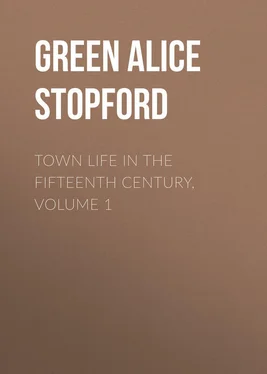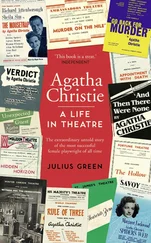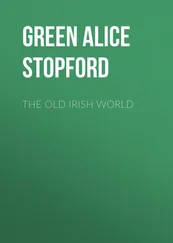Alice Green - Town Life in the Fifteenth Century, Volume 1
Здесь есть возможность читать онлайн «Alice Green - Town Life in the Fifteenth Century, Volume 1» — ознакомительный отрывок электронной книги совершенно бесплатно, а после прочтения отрывка купить полную версию. В некоторых случаях можно слушать аудио, скачать через торрент в формате fb2 и присутствует краткое содержание. Жанр: literature_19, foreign_antique, foreign_prose, Историческая проза, на английском языке. Описание произведения, (предисловие) а так же отзывы посетителей доступны на портале библиотеки ЛибКат.
- Название:Town Life in the Fifteenth Century, Volume 1
- Автор:
- Жанр:
- Год:неизвестен
- ISBN:нет данных
- Рейтинг книги:3 / 5. Голосов: 1
-
Избранное:Добавить в избранное
- Отзывы:
-
Ваша оценка:
- 60
- 1
- 2
- 3
- 4
- 5
Town Life in the Fifteenth Century, Volume 1: краткое содержание, описание и аннотация
Предлагаем к чтению аннотацию, описание, краткое содержание или предисловие (зависит от того, что написал сам автор книги «Town Life in the Fifteenth Century, Volume 1»). Если вы не нашли необходимую информацию о книге — напишите в комментариях, мы постараемся отыскать её.
Town Life in the Fifteenth Century, Volume 1 — читать онлайн ознакомительный отрывок
Ниже представлен текст книги, разбитый по страницам. Система сохранения места последней прочитанной страницы, позволяет с удобством читать онлайн бесплатно книгу «Town Life in the Fifteenth Century, Volume 1», без необходимости каждый раз заново искать на чём Вы остановились. Поставьте закладку, и сможете в любой момент перейти на страницу, на которой закончили чтение.
Интервал:
Закладка:
Four hundred years later the very remembrance of this free and vigorous life was utterly blotted out. When Commissioners were sent in 1835 to enquire into the position of the English boroughs, there was not one community where the ancient traditions still lived. There were Mayors, and Town Councils, and Burgesses; but the burgesses were for the most part deprived of any share whatever in the election of their municipal officers, while these officers themselves had lost all the nobler characteristics of their former authority. Too often the very limits of the old “liberties” of the town were forgotten; or if the ancient landmarks were remembered at all it was only because they defined bounds within which the inhabitants had the right of voting for a member of Parliament; and in cases where the old boundaries now subsisted for no other reason, it was wholly forgotten that they might ever have had some other origin. In other boroughs where the right of voting was determined in another way, the townspeople had simply lost all remembrance of the ancient limits of their territory; or else, guided by some dim recollection of a former greatness with broader jurisdiction and wide-reaching subject estates, the corporation still yearly “walked the bounds” of lands over which they now claimed no authority. As the memory of municipal life died away there were boroughs where at last no one suspected that the corporate body had ever existed for any larger purpose than to choose members of Parliament. Knowing no other public honour or privilege and called to no other public service, the freemen saw in a single degraded political function the sole object of their corporate constitution; the representation of the people was turned by them into “a property and a commerce,” and this one privilege, fed on corruption and private greed, survived the decay of all the great duties of the ancient civic life. 6 6 Rep. of Com. on Mun. Corp., 1835, 20, 21; 29-34; Papers relating to Parl. Representation, 93, 94. Vol. ix. No. 92. ii.; 31 x.
There were it is true exceptions to this common apathy, and towns like Lynn might still maintain some true municipal life, while others like Bristol might yet show a good fighting temper which counted for much in the political struggles of the early nineteenth century. But the ordinary provincial burghers had lost, or forgotten, or been robbed of the heritage bequeathed by their predecessors of the fifteenth century. With the loss of their municipal independence went the loss of their political authority; and the four hundred or so of members whom they sent to Parliament took a very different position there from that once held by their ancestors. In the Middle Ages the knights of the shire were the mere nominees of the wealthy or noble class, returned to Parliament by the power of the lord’s retainers, while the burgesses of the towns preserved a braver and freer tradition. 7 7 See Paston Letters, i. 160-1, 337, 339-40; ii. 78, 28, 31, 35-36; iii. 52-3. Richard the Redeless, passus iv. The great people occasionally exercised influence in towns; Hist. MSS. Com. v. 497; ix. 138. For various modes of voting in towns see Lynn, Hist. MSS. Com. xi. 3, 146-151; Chichester, Gross. Gild Merchant, ii. 48; Reading, Coates, 459; Sandwich, Boys, 402; Exeter, Freeman, 152; Worcester, Eng. Guilds, 373, 393; Bristol, Hunt, 86; Cinque Ports, Boy’s Sandwich, 774, 796.
At the time of the Reform Bill, on the other hand, a vast majority of the town members sat among the Commons as dependents and servants of the landed aristocracy, whose mission it was to make the will of their patrons prevail, and who in their corrupt or timid subjection simply handed back to the wealthier class the supreme political power which artisans and shopkeepers and “mean people” of the mediæval boroughs had threatened to share with them.
The true story of this singular growth of independence in the English boroughs and of its no less singular decay would form one of the most striking chapters in all our national history. But the materials for such a story, obscure, fragmentary, and scattered as they are, still lie hidden away in municipal archives, state rolls, and judicial records, as though the matter were one with which Englishmen had nothing to do. It is true indeed that the many ingenious expedients which the burghers devised to meet the peculiar difficulties of a past age would ill serve as models for our use to-day, nor can their success or failure be urged on either side of our modern controversies. They tell us nothing of the advantages or drawbacks of protection in our own time, or of the uses of state regulation of labour, or of the advisability of trade guilds. We cannot revive their courts or their privileges, any more than we can set up their gallows or call out modern citizens to dig a moat that shall be their defence from a hostile world. We cannot borrow their experience and live idly on the wisdom of the dead. But there is no more striking study of the perpetual adjustment and contrivance by which living communities adapt themselves to the changing order of the world than the study of our provincial boroughs in the Middle Ages; and Englishmen who now stand in the forefront of the world for their conception of freedom and their political capacity, and whose contribution to the art of government has been possibly the most significant fact of these last centuries, may well look back from that great place to the burghers who won for them their birthright, and watch with a quickened interest the little stage of the mediæval boroughs where their forefathers once played their part, trying a dozen schemes of representation, constructing plans of government, inventing constitutions, with a living energy which has not yet spent its force after traversing a score of generations.
There is no better starting point for the study of town life in England than the fifteenth century itself, when, with ages of restless growth lying behind them, and with their societies as yet untouched by the influences of the Renascence or the Reformation or the new commercial system, the boroughs had reached their prosperous maturity. It would be vain to attempt any reconstruction of their earlier history without having first stood, as it were, in the very midst of that turbulent society, and by watching the infinite variety of constitutional developement learned to search out and estimate the manifold forces which had been at work to bring about so complex a result; and no study of their later history is possible without an understanding of the prodigious vitality of the mediæval municipalities. There were the workshops in which the political creed of England was fashioned, where the notion of a free commonwealth with the three estates of king, lords, and commons holding by common consent their several authority, was proved and tested till it became the mere commonplace, the vulgar property of every Englishman. There the men who were ultimately to make the Reformation were schooled in all the vexed questions between church and state, and in the practical meaning of interference in civic matters by an alien power, so that the final crisis of religious excitement was but the dramatic declamation on a grand scale of lessons diligently repeated class by class for many a generation beforehand. There, too, long before the great national struggles of later centuries between England and the continental powers exalted patriotism to its highest ardour, men were already inspired by the vision of the English nation holding its post against the world, and by a passionate allegiance to its great destiny; and in every market and harbour the love of country was quickened by the new commerce with its gigantic ambition to win for England the dominion of the seas, its federations of merchants held together by the desperate struggle for supremacy, and its hordes of pirates who swept the ocean with the wild joy of their Norse ancestors. There is no break in our history when the old world merged into the new, for the spirit of the fifteenth century was the spirit of the sixteenth century as completely as it is the spirit of to-day.
Читать дальшеИнтервал:
Закладка:
Похожие книги на «Town Life in the Fifteenth Century, Volume 1»
Представляем Вашему вниманию похожие книги на «Town Life in the Fifteenth Century, Volume 1» списком для выбора. Мы отобрали схожую по названию и смыслу литературу в надежде предоставить читателям больше вариантов отыскать новые, интересные, ещё непрочитанные произведения.
Обсуждение, отзывы о книге «Town Life in the Fifteenth Century, Volume 1» и просто собственные мнения читателей. Оставьте ваши комментарии, напишите, что Вы думаете о произведении, его смысле или главных героях. Укажите что конкретно понравилось, а что нет, и почему Вы так считаете.












